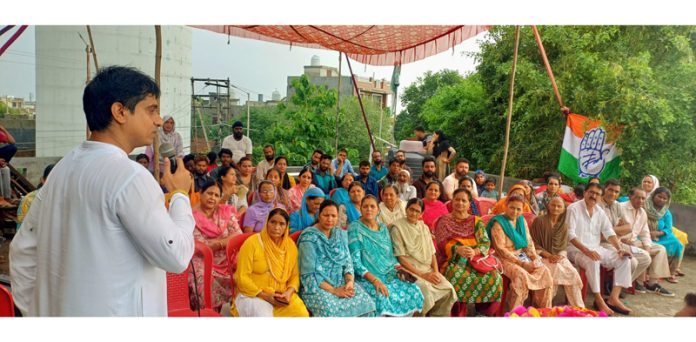Excelsior Correspondent
JAMMU, Aug 1: Indian Youth Congress (IYC) general secretary and former PYC president, Uday Bhanu Chib today slammed BJP led Govt at the Centre, for its failure in addressing basic issues affecting people of Jammu and Kashmir.
The senior Congress leader was speaking during visit to Ward No. 37 in the Jammu North Assembly segment, where he engaged with local communities, particularly the women of the area, to discuss their pressing concerns and include the same in the party’s upcoming manifesto.
In a well-attended interaction, IYC leader took time to listen to the residents, who shared their grievances regarding various issues. The women of Ward No. 37 expressed their dissatisfaction with the current state of widow and old age pensions, calling for a revival of the previous Congress administration’s beneficial systems. They also highlighted deficiencies in healthcare services, shortages of power and water supply, and the poor condition of local infrastructure such as lanes and drains.
Today’s meeting was organized by Parveen Akhtar, general secretary of the Mahila Congress in which Uday Chib and Rajni Bala, vice president of the Mahila Congress were the prominent guests. Along side local leaders including Surinder Kumar, Shambu Nath, Fiaz Diwan, Gardhari Lal, Baggi , Bablu, Rajni Sharma, Baldev Raj, Pawan Kumar, Jungbhadur Singh, and Madan Lal Singh were also present.
In his address, Uday Chib sharply criticized the BJP Government for neglecting these critical issues over the past decade. He underscored the urgency of addressing the concerns raised by the local populace and reaffirmed the Congress’s commitment to incorporating these issues into its manifesto to drive meaningful change.
Rajni Bala, in her remarks, said that Congress party continues to prioritize engagement with local communities, ensuring that their feedback is integral to shaping a manifesto that reflects their needs and aspirations. She emphasized the party’s dedication to ensuring that the voices of the people are heard and their concerns are effectively addressed in the upcoming policy framework.


